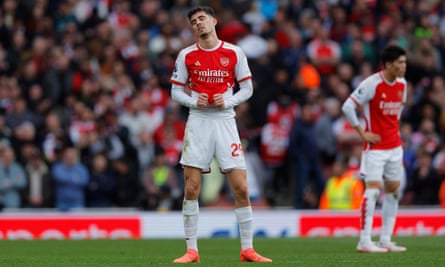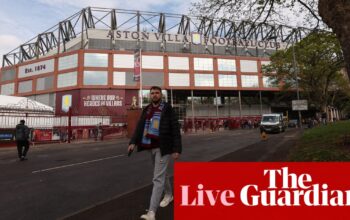It was a one-word answer to a question and, at its heart, cut through every variable or imponderable Sunday’s title deciders may throw up. Mikel Arteta was asked whether he believed in miracles: “Yes,” came the response, a smile creeping across his face and laughter quickly cascading around the room.
There is little danger of Arsenal leaving anything to chance against Everton, but no amount of rationalising can alter the fact they are relying on an outcome 160 miles north-west that would thoroughly confound the odds.
Arsenal should not beat themselves up if Manchester City stick to their well-rehearsed lines. They will finish the season within touching distance of 90 points and, with a win, guarantee the club’s second-highest total in a Premier League season.
City and Liverpool have stretched the benchmark for what is required to finish top of the pile in recent years, but it can be lost on nobody that, against normal rivals, this team would surely have sealed their place in history.
Yet the wafer-thin margin likely to separate the sides may, conversely, bring more pangs of regret than a gaping chasm. Had City sailed off into the sunset it would be harder to reel through what-ifs; listing a sequence of results that, all together, could have changed the outcome may have stretched credibility. But Arsenal will, if logic follows through, finish one minor aberration shy of the serial champions and Arteta would not be human if he avoided pondering the moments that took the prize away.
Last season, Arsenal finished five points shy of City, which is still a possible outcome now, and Arteta was moved to reckon with himself. They had crumbled in the later stages of an initially exuberant campaign and he admitted, on the eve of 2023-24, that he had spent a dark night of the soul pondering whether he could still take them forward.
There should be no crisis of faith this time around given their transformation into a steely, barely perturbable team of winners; a review of those fine details will, though, be conducted with similar intensity.
“It’s not about being unkind to yourself,” Arteta said when asked whether the hairshirt might stay in the wardrobe however the finale plays out. “It’s being honest with yourself. In the end you know what you’ve done, why you’ve done it.
“Certain decisions have been made because you’ve felt them or because you hear them, or at the right time you had enough arguments to make them. That’s the assessment and then just move on. Everything is not perfect and hopefully it’s far from perfect: that means you have a lot of room to improve.”

What could have been done better? Arsenal took four points from City, who had beaten them twice last season, and Liverpool, so nobody could say they only fed on low-hanging fruit. Perhaps the most obvious disappointment emanates from one place further down the rankings: the two setbacks inflicted by Aston Villa and Arsenal’s former manager Unai Emery look especially significant now and they may kick themselves particularly hard for missing a string of chances in a traumatic home defeat last month.
A less excusable malfunction occurred in August when Fulham, down to 10 men at the Emirates, were allowed a soft João Palhinha equaliser three minutes from time. The uncharacteristic error from Jorginho that helped Tottenham to a draw four weeks later may also loom large, as will West Ham’s heist in north London three days after Christmas. That result, at least, gives oxygen to any optimists who predict a David Moyes-engineered surprise at Manchester City on Sunday.
There will always be those, too, who believe Arteta should have adopted a win-or-bust approach instead of settling for a goalless draw on Easter Sunday. The reasoning is questionable: in bucking an eight-game losing run at the Etihad, Arsenal showed much of the durability and tactical understanding that has taken them up at least one level over the past year.
But even a juggernaut hits patches of black ice. Nobody is immune to a season’s vicissitudes: not even a City team that took seven points in a six-game spell in November and December. Arteta may focus more keenly on some of the more vexing personnel issues that faced him. Kai Havertz, signed primarily as a midfielder, became an admirable solution as a floating centre-forward and has weighed in with eight goals since mid-February.
after newsletter promotion
They were in part necessary because of the persistent knee troubles endured by Gabriel Jesus, who has simply not felt comfortable and appears a shadow of the player who turbo-charged their attack upon joining from City.
Would Arteta have added to his strike force, which is a priority for the coming pre-season, sooner if he could replay the last nine months? He has at least been able to watch Leandro Trossard step up and cover brilliantly for a patchy season’s output from Gabriel Martinelli.
In an ideal world, David Raya, firmly ahead of Aaron Ramsdale in the pecking order despite Arteta’s implausible claim that he could rotate his keepers, could have been brought into the side sooner than mid-September. “I had to adapt very quickly,” Raya said this week. “I didn’t have a pre-season with the club. It was new teammates, new standards, new fans.
“The situation with Aaron was a big one. I knew what was going to happen if I started playing: the noise was only going to happen.”
The Spaniard began shakily, not helped by a crowd still processing the phasing-out of a favourite, and perhaps an earlier immersion would have ironed out kinks such as a nervous performance in the 2-2 draw at Chelsea. Arsenal’s defence has, though, been almost immaculate all season: that is no small feat given the long-term injury to Jurriën Timber, earmarked to play at left-back, meaning they have had to muddle through in that position.
Should Arteta get his miracle, the temptation to put himself through such agonies will surely float away into the heady air around Holloway Road. “It’s something that is do-able, it can happen,” he said of the feat that lies just about within reach. “Especially knowing the quality of West Ham and how they prepare for matches. We need them, that’s for sure.”
Hard realities can bide their time until the impossible has finally faded from view.
Source: theguardian.com


